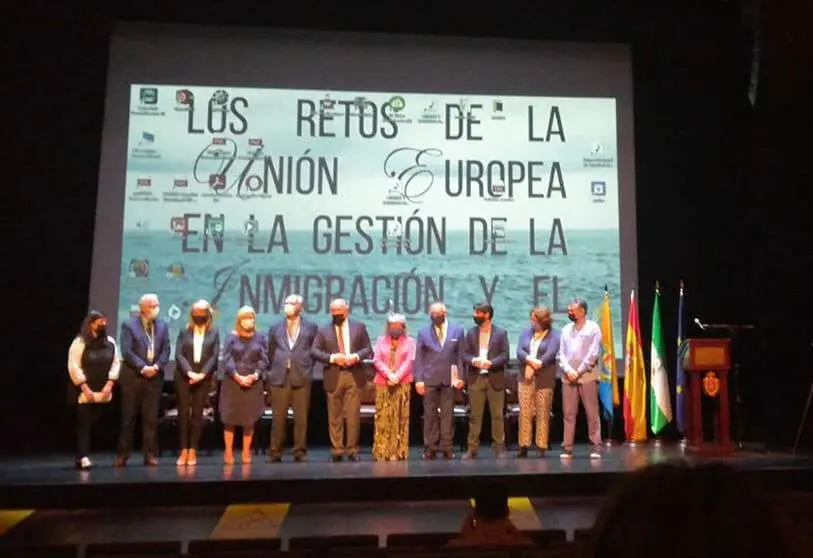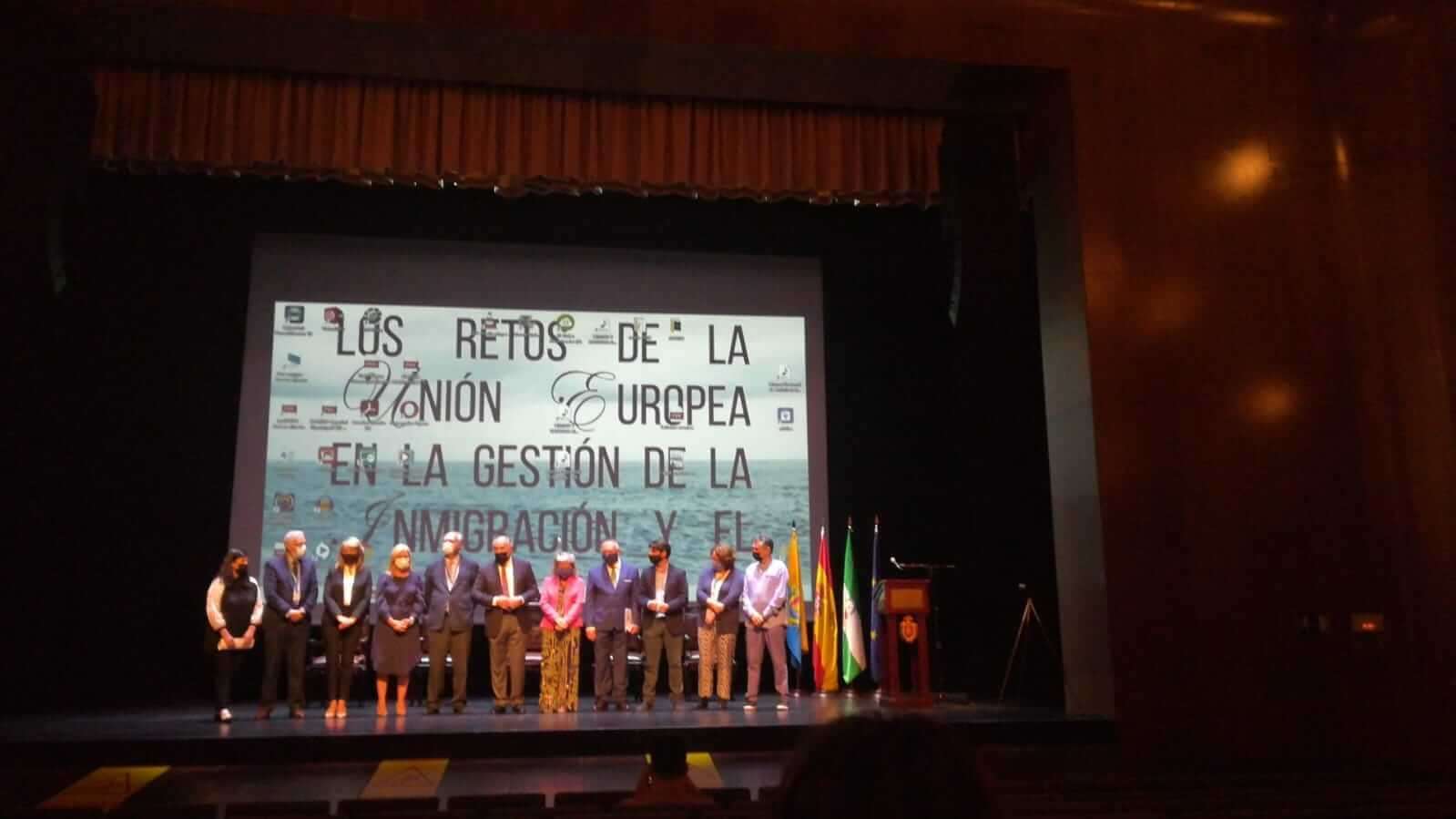The Algeciras Declaration: the political bases of immigration of the new Europe

The Mayor of Algeciras, José Ignacio Landaluce, presented the Algeciras Declaration on the challenges facing the European Union in the field of immigration last Sunday as part of the event "The EU in the field of Immigration and Asylum", promoted by the European movement.
In his presentation, Landaluce highlighted the value of the famous meeting in Algeciras, a city which in his opinion represents "the great southern border of the EU, where more than 109 different nationalities coexist". In addition, he said that it is "the headquarters of the great Strait of Gibraltar Operation" and has one of the most important ports in the world.

According to the mayor, all the principles contained in the Declaration will serve as a basis for building the "Europe of tomorrow", a Europe that has to reflect the historical reality of the present moment, free of political overtones, and ensure "rigorous and legalistic" border control, in which the rights of immigrants and asylum seekers are guaranteed.
Below is the full Algeciras Declaration:
Adopted on the occasion of the European Movement Activity for the Conference on the Future of Europe, organised by the UNED Associated Centre of Campo de Gibraltar, the Spanish Federal Council of the European Movement and the Andalusian Council of the European Movement, with the collaboration of the Ministry of Foreign Affairs (Global Spain and Let's Talk about Europe Programmes), Europe-Direct of Campo de Gibraltar, the City Council of Algeciras, the Provincial Council of Cadiz and the City Council of San Roque.
On this occasion,
A.- We reaffirm that shared competences in the area of immigration and asylum between Member States and the EU have proved useful in addressing the great migratory challenges of our time. Article 4(2)(j) of the TFEU establishes this shared competence within the framework of the area of freedom, security and justice. Competence over immigration, border control and asylum are autonomous but interrelated.
B.- We reaffirm the need for the existence of FRONTEX, the European Asylum Support Agency (EASO) and the European Agency for Large-Scale IT Systems (eu-LISA), because they are contributing to ensuring the functioning of the Schengen area and to the achievement of the objectives set out in art. 79-1 of the TFEU. 79-1 TFEU, i.e. "effective management of migration flows, fair treatment of third-country nationals residing legally in the Member States, and the prevention of and enhanced measures to combat illegal immigration and trafficking in human beings".
C.- We reaffirm that the EU can intervene, in accordance with Art. 79-2 TFEU in establishing "(a) the conditions of entry and residence and standards on the issue by Member States of visas and long-term residence permits, including those for the purpose of family reunification; b) the definition of the rights of third-country nationals residing legally in a Member State, including the conditions governing freedom of movement and residence in the other Member States; c) illegal immigration and illegal residence, including the expulsion and repatriation of illegal residents; d) the fight against trafficking in human beings, in particular women and children".
D.- We reaffirm that the legal institution of asylum and refuge, particularly the principles of non-refoulement, protection and assistance, despite the difficulties of applying common European standards, which derive from higher standards of international law, human rights and values firmly established in the European States. The Common European Asylum System therefore sets minimum standards, on reception conditions, procedures and requirements on "protection from refoulement, residence permits, travel documents, access to employment and education, social protection, health care, access to accommodation and access to integration instruments, as well as specific provisions for minors and vulnerable persons". These are therefore standards that need to be maintained and improved.
E.- We appreciate that the common immigration and asylum policy is a strategic challenge for the EU, which should result in the search for solutions, as stated in the New Pact on Migration and Asylum of 23 September 2020.
F.- We consider that the EU and its Member States have greater obligations in the framework of the prevention of conflicts and situations that generate forced population movements, which is why they must generate active policies of international cooperation that include components of democratic and institutional strengthening and mechanisms for the protection and defence of human rights.
G.- We consider that the land and maritime borders of the EU have become the most unequal in the world in economic and political terms, as well as boundaries between two worlds, placing us before very "demanding" borders. A clear and rigorous assessment of the EU's demanding border framework is a necessary precondition for managing this neighbourhood in a useful and constructive way.
H.- We reject xenophobic, racist or exclusionary manifestations that blame migrants, because an inclusive society is part of European identity and values.
In this sense, in order to achieve a common European immigration and asylum policy that is fairer, more balanced and in line with European values, the following should be considered:
PROPOSALS
1.- The EU's current migration policy is limited, short-term and uncoordinated and should be proactive. Therefore, there is a need for a general European regulation of harmonised access for potential immigrants, which also allows for the maintenance of the current welfare system in the EU.
2.- The EU and its Member States must be aware that unwanted human displacement cannot place unbalanced burdens on the European states closest to the places of contact. For this reason, European solidarity must lead to a fair distribution of displaced persons, with European funding and, if necessary, financial contributions according to different income levels. For this reason, the reception of migrants from mass influxes must be equitable within the EU framework, as must the responsibility for financial burdens.
3.- The Common European Asylum System has shown its shortcomings by having established a regulatory framework that is in urgent need of reform, including the transformation of its regulatory category from Directives to Regulations in order to achieve greater harmonisation.
4.- European solidarity cannot be voluntary, but must consist of the adoption of the necessary regulatory reforms to provide for specific obligations, as a structural instrument. Moreover, as long as the Dublin system and its criteria for assigning responsibility for international protection applications remain unchanged, relocation as a solidarity measure must be pre-eminent and cannot be replaced by a "flexible" solidarity in the service of return. A human rights approach to solidarity is required, so that the participation of asylum seekers is guaranteed.
5.- It is necessary to regulate safe channels of access to international protection, avoiding recourse to mafias and dangerous journeys that entail an intolerable loss of human life.
6.- It is necessary to reinforce the mechanisms for early identification of the international protection needs of people arriving on European shores and for them to be referred to the asylum procedure.
7.- The Mediterranean borders, in particular, deserve preferential attention from the EU. The EU has insufficient means to manage uncontrolled migratory flows. To this end, proactive cooperation with the states of the southern shore, especially Morocco and other states of origin and transit, is essential.
8.- The EU must address the problems at source, facilitating human and material capacity-building, as well as awareness-raising to improve operational capacities and institutional structure.
9.- When immigrants are unaccompanied minors, it should always be the courts and not the government authorities who are responsible for determining the best interests of the minor, which should govern all state action in relation to their protection, including expulsion or return when appropriate.
10.- The European Union and its Member States must regulate integration processes in such a way that they culminate in the acquisition of nationality (if the immigrant so requests), and therefore the principles of integration and equality must take precedence over other considerations.
11.- Access to residence and the legal conditions for its cessation or loss should be regulated by the EU in such a way as not to make invisible or exclude immigrants who have not accessed or have lost their right to reside.
12.- The promotion of integration must be carried out with the effective application of the principle of in dubio pro homine.
13.- International Development Cooperation should not be conditional on the management of migratory flows from states bordering the EU.
14.- The European education system must incorporate the values of inclusive citizenship and respect for diversity in order to prevent racist or xenophobic judgements regarding immigration.
These proposals require political will and citizen impetus. This requires a rigorous application and an extensive interpretation of the EU treaties or, if necessary, their reform.
Algeciras, 9 October 2021.








